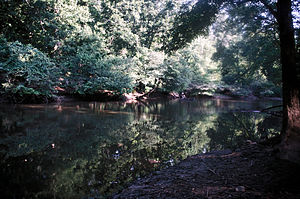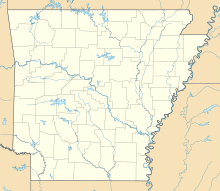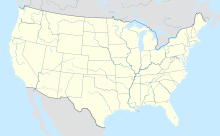Battle of Jenkins Ferry
| Battle of Jenkins' Ferry Engagement at Jenkins' Ferry |
|||||||
|---|---|---|---|---|---|---|---|
| Part of the American Civil War | |||||||
 Battle of Jenkins' Ferry State Historic Site |
|||||||
|
|||||||
| Belligerents | |||||||
|
|
|
||||||
| Commanders and leaders | |||||||
|
|
|||||||
| Units involved | |||||||
| Department of Arkansas | Army of Arkansas | ||||||
| Strength | |||||||
| 12,000 | 10,000 | ||||||
| Casualties and losses | |||||||
| 700 | 1,000 | ||||||
|
|
|||||||
The Battle of Jenkins' Ferry (April 30, 1864), also known as the Engagement at Jenkins' Ferry, was fought at Jenkins' Ferry, southwest of Little Rock
(present-day Grant County, Arkansas), during the American Civil War. It was the climactic battle of Steele's Camden Expedition, a part of the Red River Campaign. As a result of the battle, Federal forces were able to complete a retreat from a precarious position at Camden to their defenses at Little Rock.
In March 1864, the United States Army in Louisiana under the command of Major-General Nathaniel Banks and the United States Navy operating on the Mississippi River under the command of Admiral David Porter launched the Red River Campaign. The campaign's immediate objective was the capture of Shreveport, Louisiana, which was the headquarters of General Kirby Smith, commander of the Confederate Trans-Mississippi Department. Shreveport also was the temporary capital of Louisiana, a major supply depot and a gateway to Texas. An incidental objective of the campaign was to purchase cotton, which was in short supply in the northern States and thereby possibly to win the loyalty of planters along the river for the United States. It was thought this action might expand Reconstruction in Louisiana.Henry Halleck, Major-General and General-in-Chief of the Armies of the United States, who devised the plan, also wanted to open the road to the occupation of Texas by U.S. forces and to discourage French incursions from Mexico. France had invaded and occupied Mexico in June 1863, setting up a government under their puppet "emperor," Maximilian.
...
Wikipedia


